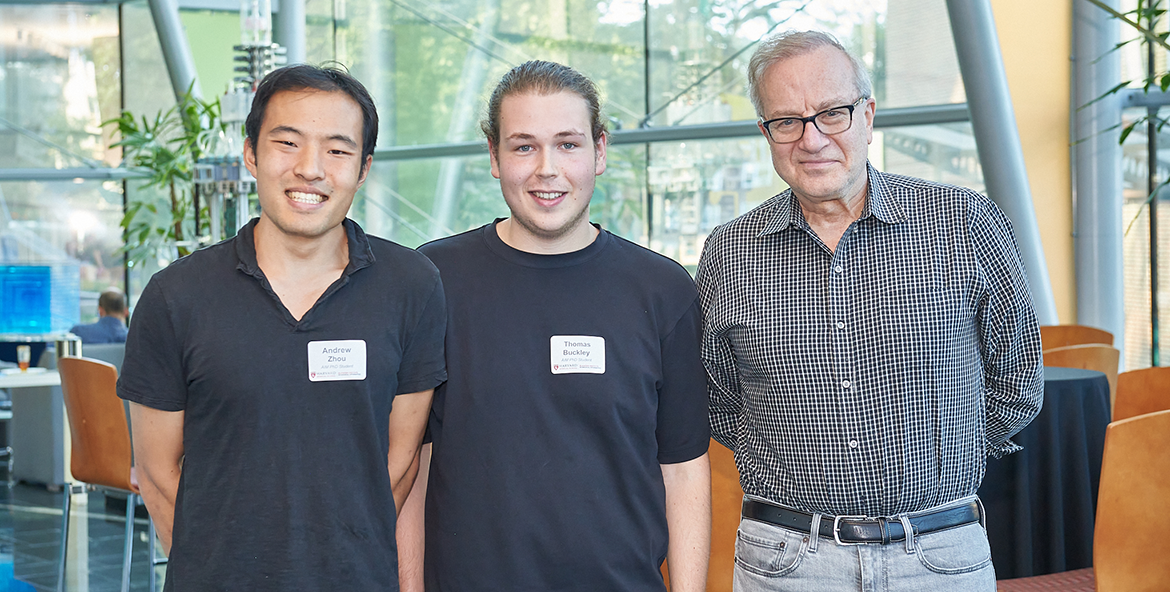Gift Empowers Trainees To Leverage Clinical AI for Better Health
$6 million in funding equips scientists, leaders of the future
$6 million in funding equips scientists, leaders of the future

Harvard Medical School’s ability to lead a transformation in medical education and health care through the innovative and responsible integration of artificial intelligence (AI) has now been amplified by a $6 million commitment from the Dunleavy Foundation.
The gift establishes the Dunleavy Fund for Clinical AI, which will be used to strengthen the School’s efforts to equip future researchers, policymakers, and innovators to harness AI to improve health care and medical science.
The fund — comprising a $1 million grant and a $5 million endowed gift — is providing educational opportunities for PhD- and master’s-level graduate students and undergraduates through internships, fellowships, events, programs, and research dissemination.
“To remain at the forefront of medical education, HMS must anticipate the physician of the future, practicing in an environment rich with cognitive support resources powered by artificial intelligence tools,” said HMS Dean George Q. Daley. “The time to invest in building a pipeline of AI experts for health care is now.”
Supporting a PhD track for AI in medicine
One of the key initiatives backed by the fund is the Artificial Intelligence in Medicine (AIM) PhD track, which welcomed its inaugural class in 2024 and is part of the Biomedical Informatics PhD program.
“The AIM PhD track is focused on recruiting young students right out of college who have strong training in quantitative disciplines like computer science, engineering, or mathematics and who have a demonstrated interest in biology, medicine, and contributing to effective improvements in clinical care,” said Isaac (Zak) Kohane, the Marion V. Nelson Professor and chair of the Department of Biomedical Informatics (DBMI) in the Blavatnik Institute at HMS.
Kohane noted that the recent surge of AI applications in medicine has not been coupled with a workforce that understands how to develop AI models that are safe, effective, and work well both for patients and clinicians in their daily workflow. The PhD track has potential to fill this gap.
“We will not only provide advanced courses in machine learning and other relevant fields for developing AI but also offer in-depth analyses of the challenges facing medicine,” Kohane said. “Students will gain substantial knowledge of biology and biomedical topics needed to effectively address those medical challenges.”
The PhD track exposes students to important AI applications in health care, such as accelerating diagnoses, particularly those of rare diseases; selecting therapies that are individualized for each patient’s disease; and predicting and preventing diseases to reduce care costs.
The Dunleavy Fund establishes AIM PhD fellows within the track. These exceptional computational students will be trained to harness large-scale biomedical data and advanced AI methods to develop new clinical research tools.
Building a biomedical AI pipeline
The Dunleavy Fund also provides support for DBMI to pursue pipeline programs that engage young scientists in the field of AI in medicine. One such program will be a hackathon that allows select undergraduate students to receive access to clinical data, allowing them to explore current topics of interest and develop creative solutions.
Another area of support is the creation of research internships through DBMI for undergraduate and master’s students. These will provide opportunities to work directly on methodology and applications of AI in medicine with the goal of being mentored toward publication.
Bridging fields to achieve AI’s health care potential
HMS alumni Keith Dunleavy, founder and CEO of health care technology company Inovalon, and his wife, Katherine Dunleavy, a physician specializing in internal medicine, said their exposure to visionaries in AI and medical domains has been an invaluable learning experience.
They said they have been repeatedly reminded of the challenges experienced by those who are extremely technologically gifted, sophisticated, and resourced but nevertheless lack an understanding of how health care is delivered, how new diagnostics or treatments are discovered, or how the vast health care system is administered.
“With this in mind, we are hopeful that by supporting training that brings these fields together, we can help in some small way to bring the power of AI to the great needs of medicine and health care,” said Keith Dunleavy, who is also a member of the HMS Board of Fellows.
Katherine Dunleavy, who is also a member of the HMS Advisory Council on Education, said the couple hopes that by emphasizing education and training in AI that is specifically geared toward its application in medicine and health care, the fund will facilitate the growth of a particular type of professional.
“We hope this approach brings an important element of being mission-driven with respect to the cornerstones of medicine and health care: those based on caring, empathy, and positive impact for society,” she said.
© 2025 by the President and Fellows of Harvard College